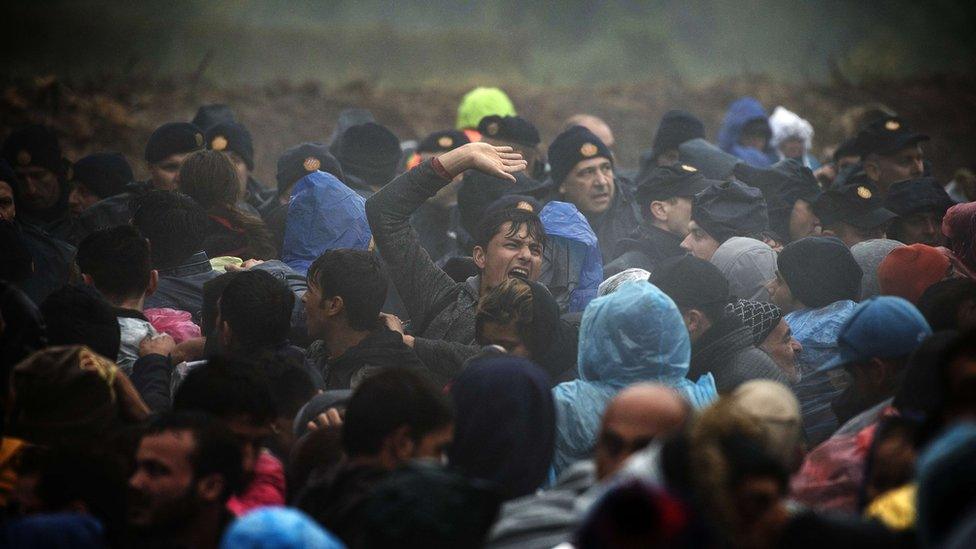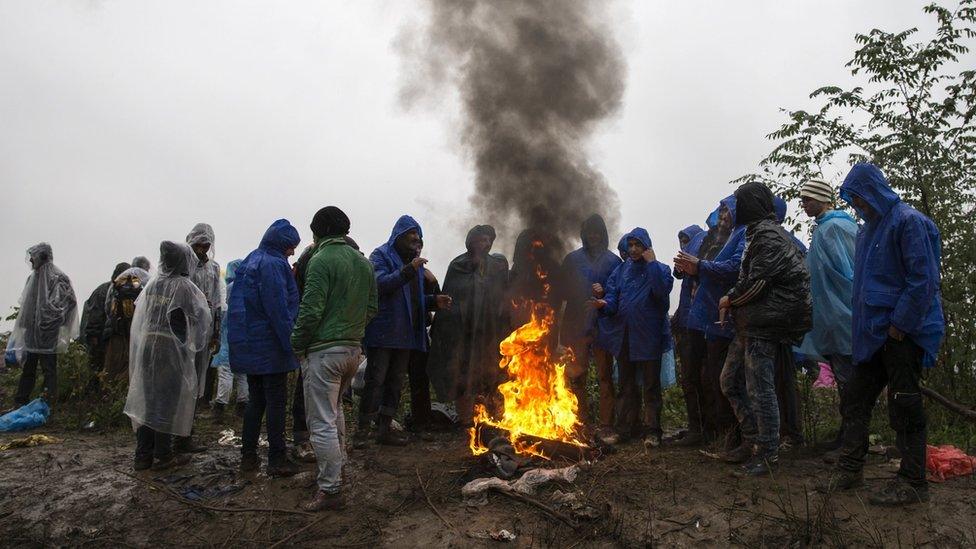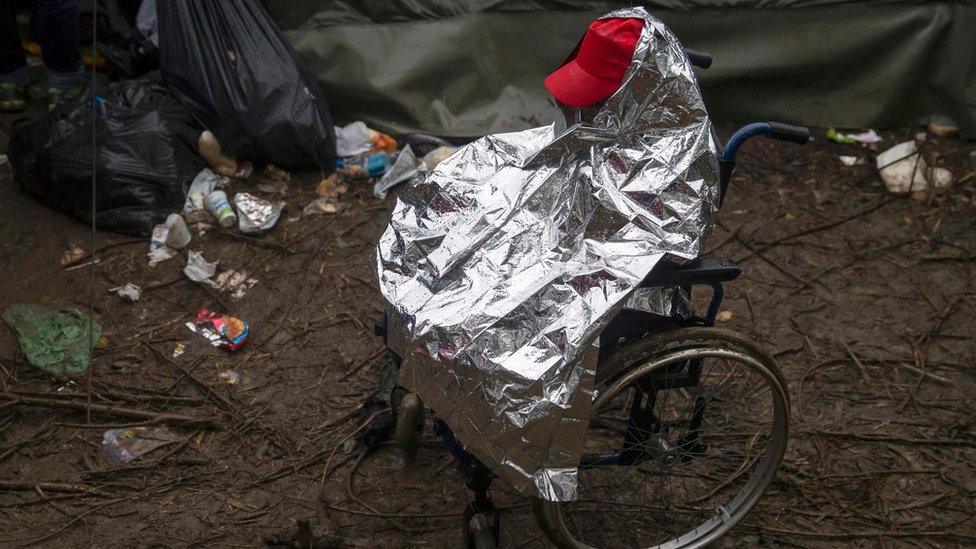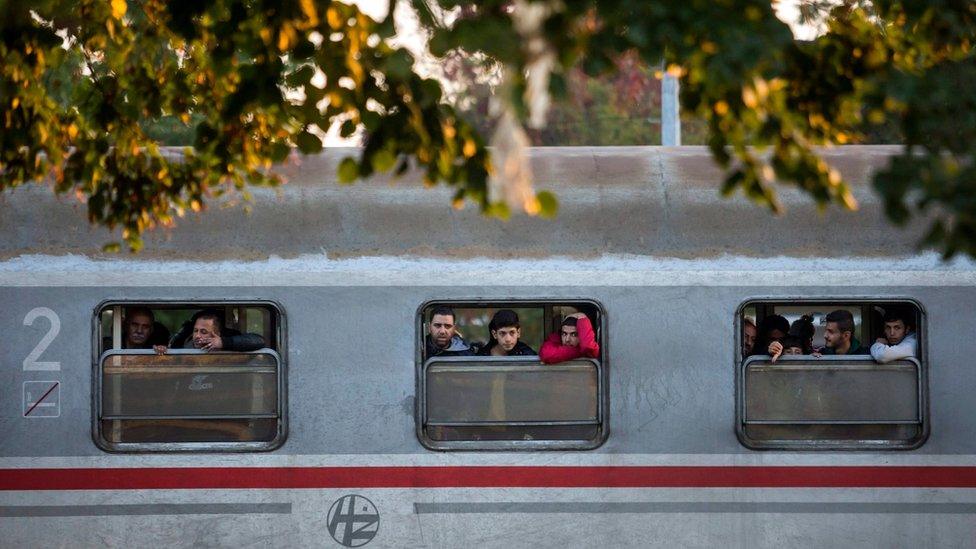'This is no-man's land': Border closures leave thousands stranded
- Published

Thousands are stranded near the small Serbian village of Berkasovo
Aid workers say they fear for the health of thousands of refugees and migrants stuck outdoors in worsening conditions, as eastern European countries take measures to stem the flow of people crossing their territory.
With Hungary, Croatia, and Slovenia closing all or parts of their borders, bottlenecks have left many stranded at ill-prepared crossing points, exposed to the elements and short of vital supplies.
At Berkasovo in Serbia, near the border with Croatia, more than 3,000 people are massed at a tiny transit camp designed to hold a maximum of 250.
"The conditions here are very bad," said Melita Sunjic, the West Balkans spokesperson for the UN's refugee agency, UNHCR.
"This place was installed as a transit camp for five bus loads of people, now we have more than 60 bus loads. We cannot keep them dry and we are running out of food and water," she said.
"We have problems with crowd control, there are no police and people are getting agitated. This is no man's land."

Temperatures have plummeted along the Serbia-Croatia border
Forced to stand out in the open, there is little possibility of sleep for the refugees and migrants. Some have strung tarpaulins to trees in an attempt to escape the rain. Frustrated, they chant: "Open the gate!"
There is uncertainty over how many, if any, will be allowed through into Croatia on Monday. There will almost certainly be new arrivals before darkness falls and there is no lighting at the camp.
"It's really a dire, dire situation," said Ms Sunjic. "We have a lot of small children, I saw a man just now carrying a baby that was no older than a few weeks. We have disabled people, we have people who got sick on the road.
"Save for the small tarpaulins, they are out in the rain, just waiting. This is not a place for people, they can't sleep - they can just stand upright in the mud. We have to find another solution."

There is precious little shelter available for migrants
There are thought to be about 10,000 refugees and migrants in Serbia, hopeful of reaching Germany or Austria. But the borders that lie between them and their destination are closing like falling dominos.
When Hungary sealed its border with Croatia at midnight on Friday, Croatia began to limit the number of people it was allowing in from Serbia, and redirected people towards Slovenia.
Croatia asked Slovenia to accept 5,000 migrants daily but Slovenia has set a limit at half that number, saying it will only take in as many people as can then exit into Austria.
At the Croatia-Slovenia border, near the town of Cakovec, nearly 2,000 people are stranded while the negotiations continue. Many slept on a packed train overnight.
"It's raining heavily here and it was raining through the night," said Ralf Gruenert, the UNHCR's senior emergency coordinator for Croatia.
"We have distributed some raincoats and high-energy biscuits, but there is very little shelter. This morning, Croatian police allowed some refugees to move under the shelter of the border checkpoint but there was very little space. Some refugees hunkered down on plastic sheeting."
Several hundred people had been allowed through the border by early afternoon, he said, but the vast majority were still stranded on the Croatian side.

Nearly 2,000 migrants spent the night aboard a packed train in Cakovec
Cakovec simply doesn't have sufficient infrastructure to cope with the number of migrants, said Katarina Zoric, a spokesperson for the Croatian Red Cross.
"They are supposed to just pass through there, there is no camp or shelter," she said.
The charity is now preparing for thousands more people to enter Croatia from Serbia.
"We have to make sure everything is ready," Ms Zoric said, while en route to Opatovac, a Croatian transit camp on the border with Serbia. "We have enough supplies for now, but we don't know what will happen over the next week. We are doing our best to cope."
Linda Low, the charity's European communications manager, warned that the situation is likely to worsen as winter approaches.
"The humanitarian needs exceed the resources available, especially with the increasingly cold weather. Sometime this week we are expecting the temperature to reach zero in Serbia," she said.
"We are concerned about increasing vulnerability. Flu season is here and people have been walking for hours in the cold and rain. Soon, as winter approaches, there will be snow, and people's health will deteriorate even more."


A note on terminology: The BBC uses the term migrant to refer to all people on the move who have yet to complete the legal process of claiming asylum. This group includes people fleeing war-torn countries such as Syria, who are likely to be granted refugee status, as well as people who are seeking jobs and better lives, who governments are likely to rule are economic migrants.

Read more:
Can deeds match words?: The challenges ahead for the EU and Turkey
The pull of Europe: Five migrant stories
Merkel under pressure: Chancellor's migrant policy faces criticism at home
Focus on Turkey: Why the EU views Syria's northern neighbour as key
Crisis in graphics: Migration numbers explained